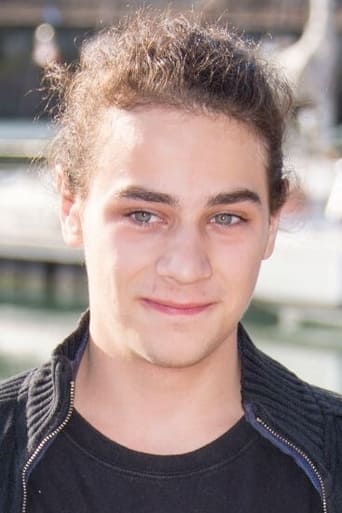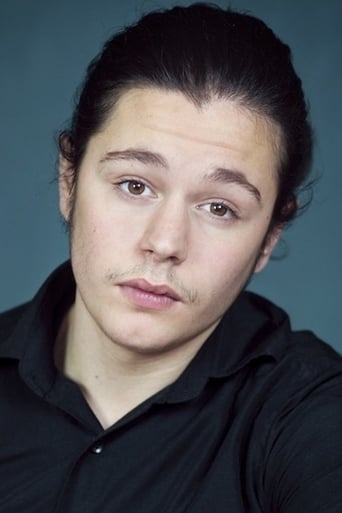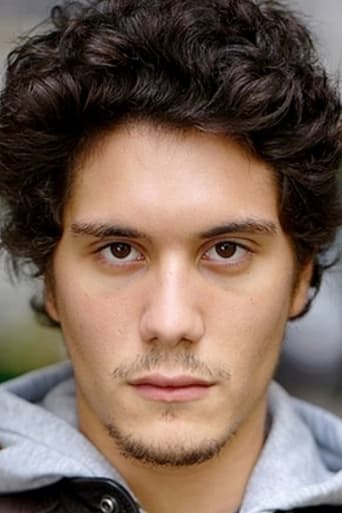Diagonaldi
Very well executed
ThiefHott
Too much of everything
Stoutor
It's not great by any means, but it's a pretty good movie that didn't leave me filled with regret for investing time in it.
Afouotos
Although it has its amusing moments, in eneral the plot does not convince.
Kirpianuscus
different by novel. first - for intentions. because it is a war film. with the tension and shadows who define this genre. but it has the sin to not be the most convincing war film. but this remains only a detail. because the surprise is the status of secondary character of the original game. against good work of children actors. against the possibilities of a fascinating answer to The boys from Pal street. and this is the source of disappointment - a confuse message, reflecting, as premises, all. the universe of adults, the world of children, Laetitia Casta and Guillame Cannet as the impossible couple, the not real convincing facts, gestures and dialogues, the desire of return to the book as consolation for a too ambitious adaptation of it.
Mathias Dubois
If you're as old as me and you grew up in a french-speaking environment, you've probably been affected in one way or another by Yve Robert's adaptation of Louis Pergaud's novel from 1962.This new adaptation alternates the focus from the kid's perspective to its parallels in the grown-up's world. The time is now the mid-40's and the war of two groups of kids from two villages fades behind the gruesome reality of the Nazi occupation, persecution of the Jews and collaboration, thus turning the original story into a rather undramatic sideshow. Since the late 60's at least, French cinema has been obsessed with the deep flesh wound left by the Nazi occupation in French society, which had torn the country into heroes and traitors. The idea to set the story in this context possibly sprung from the issue of a new, rising antisemitism, as the story now features a clandestine Jewish girl and her ruthless antagonist: the spineless french militiaman. Unfortunately, the new terror of antisemitism has long 'evolved' and has grown deaf to the sort of reasoning used in this movie, leaving its message only audible to those who already agree, which is a shame. What's left is a rather campy, at times charming but mostly predictable story that leaves no doubt about its message of humanism.Finally, the screenplay is passable. A movie to watch if there's really nothing else to do. For a better experience: Yves Robert's cult classic's still the real deal.BTW: Amazing how much the cult figure of the 1962 movie, "Petit Gibus", resembles the actor of this movie. Seems like the producers knew the movie couldn't live without resurrecting this charming character. Amazingly, they didn't go as far as to revive his signature phrase ("Si j'aurais su, j'aurais pas venu" - "If I'd known, I'd not come").
ma-cortes
This is a marvelous ode to childhood plenty of innocence , friendship , cooperation , curiosity and comradeship . Director Christophe Barratier shows these important and universal values through children's minds . It is a notorious picture of great educational content , including an enjoyable and attractive message . It is set in occupied France, when the French Resistance came in all shapes and sizes , there Lebrac (Jean Texier), who is coming of age , leads a play war between two rival kid gangs, but his feelings for Violette (Bachelier) , a Jewish girl in danger of being discovered by the Nazis, encourage Lebrac to face the reality of what's happening around him . As the children engage in battles where they cut of the buttons, shoe-laces, belts and braces of their captured opponents . The boys are frequently battling with their wooden swords, sticks or building traps in the woods expecting to remove the buttons from the enemies' clothes. The two leaders of the groups nonetheless develop a grudging admiration of the other and an estranged friendship . Meanwhile , there are developed troublesome relationships between parents (Kad Merad , Gérard Jugnot) and children ; furthermore , a love story between a Master (Guillaume Canet) and a shopkeeper (Laetitia Casta) ; and Lebrac has a crush on the Jewish girl .French cinema has a great ability in dealing with films about childhood , with interesting and thought-provoking messages that are a clear example of an allegory of notorious values such as friendship , honor , collaboration and anti-war denounce . " La Guerre Des Boutons " is a song and an allegory to childhood , where curiosity and innocence are the most characteristic attributes having children . Amusing and fun scenes in which rival gangs of young French kids enjoin in constantly escalating battles that ultimately entails the removal of the buttons from the clothes of captured losers . We do see the world we know each and every one of us, but from his innocent look , with much more easygoing . That's where all the power comes from this movie, because of their protagonists playing war according to the rules , with a greater sense of loyalty and honor which is contemplated in the real conflict."La Guerre des Boutons" is a splendid ode to childhood , a nostalgic trip to the past in which we become children an hour and a half , where everything was discovered , in which the games were serious things . It's a kid's movie but its strength lies in its universal character , not a story just for kids , it's for everyone . This entertaining film displays a colorful as well as evocative cinematography by John Poisson . In addition , a sensitive and rousing musical score by Philippe Rombi . The motion picture was well directed by Christophe Barratier ; its approach is exquisite and original. It is a great antiwar portrait appointed to children as well as adults .Based on the novel by Louis Pergaud , it has been adapted several times , being the best version a magnanimous work by Ives Roberts (1962) with Jacques Dufilho as L'Aztec's father , Michel Galabru as Bacaillé's father , Michèle Méritz L'Aztec's mother , and Jean Richard as Lebrac's father . Furthermore , in 2011 was realized ¨La Guerre Des Boutons¨ by Yann Samuell with Mathilde Seigner , Fred Testot and Alain Chabat . And previously a British/French rendition , ¨War of buttons¨ (1994) by John Roberts with Liam Cunningham as The Master , Johnny Murphy as Jonjo and Colm Meaney as Geronimo's Dad . And an early retelling (1937) titled La ¨Guerre Des Gosses¨ by Jacques Doray with Jean Murat , Saturnin Fabre and Charles Aznavour .
dbdumonteil
50 years after Yves Robert's famous version which was successful but was carefully kept "suitable for all audiences" and thus avoided Pergaud's Rabelaisian style .Louis Pergaud is barely mentioned in the cast and credits ,the "screenwriters" taking the lion's share ;it must be said that the book has undergone lots of changes as Robert did in the early sixties:but whereas Robert transposed the action to his era,this new version chose the end of WW2,with its resistant fighters,the collaborators and traitors,the Jews protected by the Justs.It allows a parallel between the buttons war and the "real" war which is somewhat artificial though (who has not guessed the truth about the nice schoolteacher -played by talented Canet-? about Violette?)Pergaud's novel was written in 1913,and the writer died in the war that was about to break out.The children remain true to form,particularly the young actor who plays Lebrac ,in love with Violette (who replaces the female character of the book ,La Marie-Tintin ,not always with good results : sometimes it flounders in the intellectual girl/boy dunce cliché ) who ,like Anne Frank ,writes a diary;Petit Gibus is funny ,although perhaps not as much as that of Yves Robert.This is pleasant to watch ,but full of WW2 clichés and ,as far as the forthrightness of the language is concerned,not an improvement on its predecessor;I personally would take this black and white priceless early version any day.





